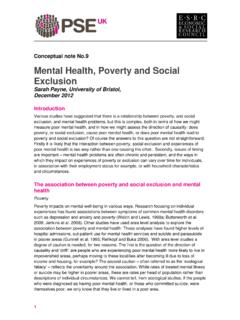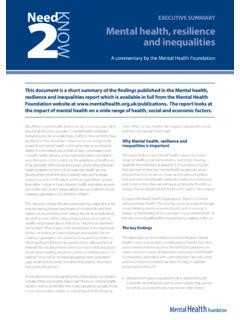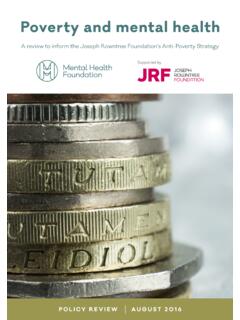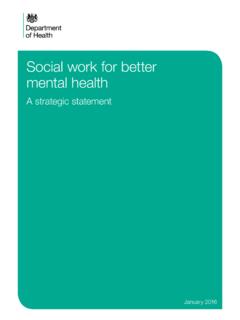Transcription of Mental Health and Social Exclusion - NFAO
1 Mental Healthand Social Exclusion Social Exclusion Unit Report SummaryIn Spring 2003, the Prime Minister and the Deputy Prime Minister asked the Social Exclusion Unit(SEU) to consider what more could be done to reduce Social Exclusion among adults with mentalhealth problems. The project focused on people of working age, and considered two main questions: What more can be done to enable adults with Mental Health problems to enter and retain work? How can adults with Mental Health problems secure the same opportunities for socialparticipation and access to services as the general population? This report is the outcome of a wide-ranging study that has drawn on: a detailed review of literature and research, including seven commissioned literature reviews; a written consultation, which received over 900 responses from people with Mental healthproblems and carers, the voluntary sector, Health and Social care bodies, local authorities,housing, employment and benefit services; seven consultation events around England, attracting 500 people, to seek the views of peoplewith Mental Health problems and carers.
2 Four local area research studies to provide an in-depth understanding of delivery took place in Bromley/Penge in London, Peterborough, Liverpool and were held with a range of stakeholders, including people with Mental Health problems,carers, staff from the statutory and voluntary Health sector, Social care, employment, housingand education services; over 50 visits around the country to schemes that are already tackling the problems highlightedin this report; and close liaison with government departments and key stakeholders, including voluntary and publicsector SEU's remit covers England only. However, the project has drawn on lessons from Wales,Scotland and Northern Ireland and is likely to be relevant throughout the UK. Quotations in this report come from the SEU's visits and meetings unless otherwise Health andSocial ExclusionSocial Exclusion Unit Report SummaryJune 2004 Office of the Deputy Prime Minister, LondonThe Office of the Deputy Prime MinisterEland HouseBressenden PlaceLondon SW1E 5 DUTelephone 020 7944 4400 Web site Crown Copyright 2004 Copyright in the typographical arrangement rests with the publication, excluding logos, may be reproduced free of charge in any format or medium for research, privatestudy or for internal circulation within an organisation.
3 This is subject to it being reproduced accurately and not used ina misleading context. The material must be acknowledged as Crown copyright and the title of the publication any other use of this material, please write to HMSO Licensing, St Clements House, 2 16 Colegate, Norwich NR3 1BQ Fax: 01603 723000 or email: is a value added publication which falls outside the scope of the HMSO Class copies of this publication are available from:ODPM PublicationsPO Box 236 Wetherby LS23 7 NBTel: 0870 1226 236 Fax: 0870 1226 237 Textphone: 0870 1207 405 Email: in Great Britain on material containing 75% post-consumer waste and 25% ECF pulpJune 2004 Product code: 04 SEU 02281 PRIMEMINISTER SFOREWORDM illions of people suffer from Mental Health conditions some time in their a minority, these can be severe or long-lasting.
4 Even now, with welcome newattitudes in society, those suffering Mental distress still find themselves excludedfrom many aspects of life the rest of us take for granted from jobs, familysupport, proper Health care and community life. This Exclusion has a huge impact on the individuals concerned and on our widersociety. It frequently leads to a downward spiral of unemployment, poverty, familybreakdown and deteriorating Health . The costs to individuals, their families andthe country are huge, not just now but also in the future. Disadvantage, too,often passes from one generation to the is this more likely than in our most deprived neighbourhoods where Mental Health conditionsare more common and their potential impact greatest. There are also particular barriers and problemsfaced by those from ethnic minorities.
5 None of this is something any Government committed to building a fairer and more inclusive societycan ignore. We have already put in place far-reaching measures to improve NHS Mental Health services,strengthened civil rights and increased support to help people back into work. Community initiatives,often led by an expert and innovative voluntary sector, have been encouraged. But we need to do moreif we are to ensure all can share in our rising prosperity and increasing opportunity. That is why the Government asked the Social Exclusion Unit to examine how we could better attack thecycle of deprivation linked to Mental Health . The comprehensive programme outlined in this report setsout how we can improve Health and well being, boost employment and training, increase support tofamilies and prevent the isolation of those with Mental Health conditions.
6 It will also ensure greater helpis given in finding permanent homes vital for the recovery and successful integration of those withmental Health conditions. The report calls on all Government departments and agencies to work together more effectively than inthe past. We must rise to the task. But it also requires determined action to end the stigma of mentalhealth a challenge not just for Government but for all of us. Tony Blair1 SUMMARYThe with long-term Mental Health problems are one of the most excluded groups in many want to work, fewer than a quarter actually do the lowest employment rate forany of the main groups of disabled often people do not have other activities to filltheir days and spend their time alone. Health problems are estimated to cost the country over 77 billion a year through the costsof care, economic losses and premature intervention to keep people in work andmaintain Social contacts can significantly reduce these costs.
7 Once a person has reached crisispoint, it is much more difficult and costly to restore their employment and Social status. 3 Social isolation is an important risk factor for deteriorating Mental Health and suicide. Two-thirdsof men under the age of 35 with Mental Health problems who die by suicide are Mental Health problems, such as schizophrenia, are relatively rare affecting around onein 200 adults each year,4although they can also have a wider impact on the lives of friendsand , anxiety and phobias can affect up to one in six of the population at any one time,5with the highest rates in deprived spend a third of their time on mentalhealth costs for anti-depressant drugs have risen significantly in recent years,8and there are significant variations in access to talking therapies.
8 900,000 adults in England claim sickness and disability benefits for Mental Health conditions,with particularly high claimant rates in the group is now larger than the total numberof unemployed people claiming Jobseekers Allowance in Placement andSupport programmes in the US have achieved employment rates of over 50 per cent amongpeople with severe Mental Health problems,11but these have not been widely implemented inthis country. For some of us, an episode of Mental distress will disrupt our lives so that we are pushed out of thesociety in which we were fully participating. For others, the early onset of distress will mean socialexclusion throughout our adult lives, with no prospect of training for a job or hope of a future inmeaningful employment.
9 Loneliness and loss of self-worth lead us to believe we are useless, and sowe live with this sense of hopelessness, or far too often choose to end our lives. Repeatedly when webecome ill we lose our homes, we lose our jobs and we lose our sense of identity. Not only do we costthe government money directly in Health , housing and welfare payments, we lose the ability to contributeour skills and economically through taxes. So we are perceived as a Social burden. We lose sight of our potential, and when we try to move on,discrimination and stigma prevent us getting jobs that use our skills and experience and push us out ofhousing and education. The jobs we do get are poorly paid, and don t utilise our skills and there are practical considerations we stand to lose our financial security, whether state benefitsor private insurance, when we attempt to rebuild our lives.
10 We also stand to lose the Health and socialservices that we find helpful, so that at the time when we most need support, our coping mechanismsare undermined. Moving back into society becomes a risky business. Health problems can have a particularly strong impact on families both financially andemotionally. Carers themselves are twice as likely to have Mental Health problems if they providesubstantial estimated 6,000 to 17,000 children and young people care for an adult withmental Health sustainable, inclusive communities is about everyone having a stake. Being in work andhaving Social contacts is strongly associated with improved Health and well-being. People withmental Health problems have much to offer. If they are able to fulfil their potential, the impact ofmental Health problems on individuals, their families and society can be significantly reduced.








